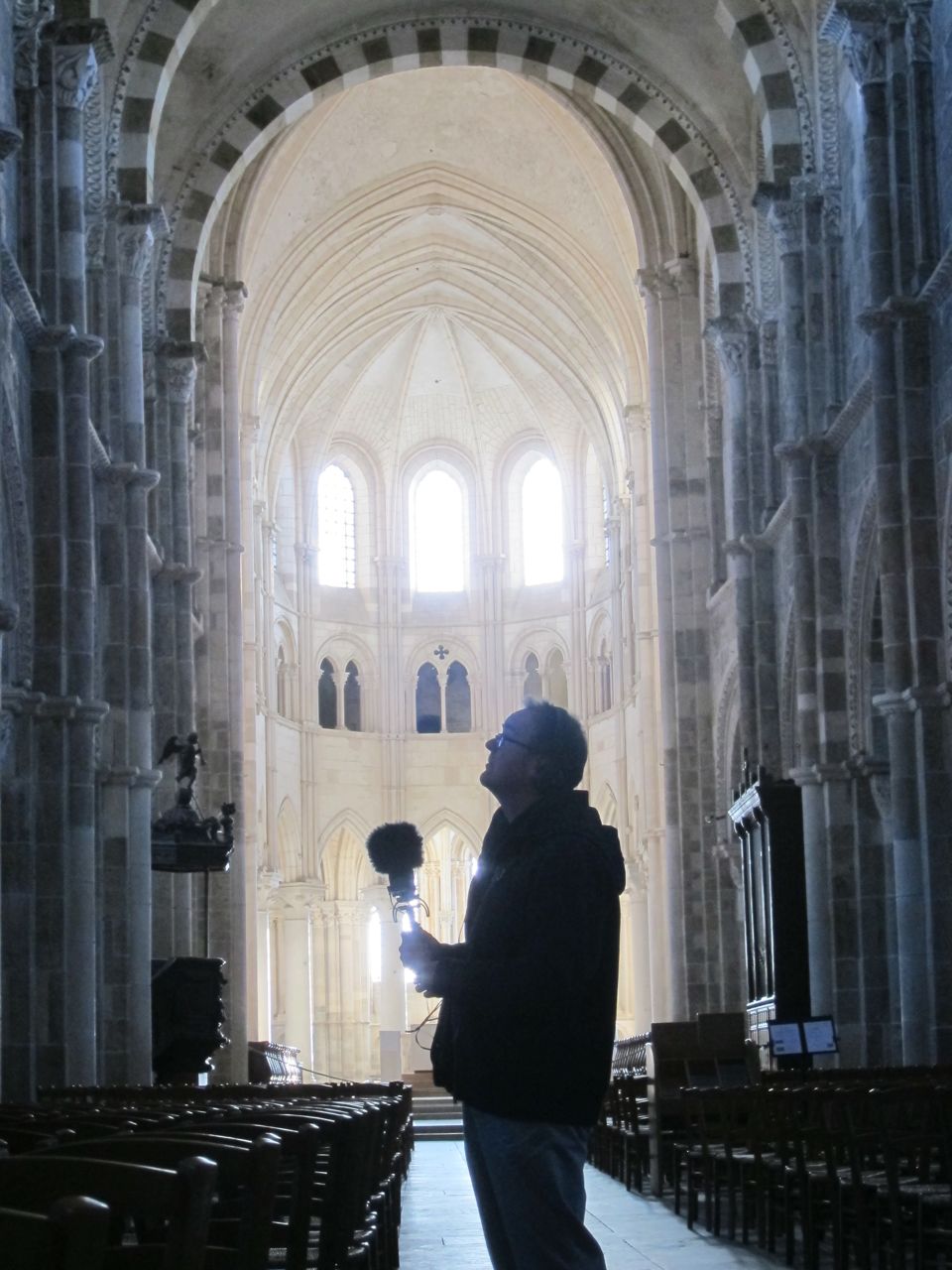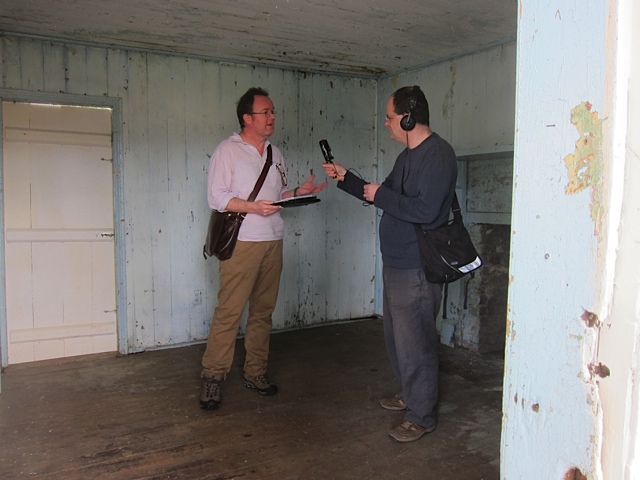David Hendy is part media historian, part writer/broadcaster, and completely passionate about sound. Most recently, he created the excellent 30-part radio series on BBC Radio 4 Noise: A Human History, also available as a book under it’s slightly longer title Noise: A Human History of Sound and Listening. While most sound designers preoccupy themselves with the quality of the sounds they craft, Hendy’s work examines why we hear what we hear, and what it means to us as people and our relationships with one another. Yes, we’ve overrun again as “Noise” was last month’s theme, but I am confident Hendy’s thoughts on the noise around us will change the way you listen…
Why “Noise” and not “Sound”?
I’m passionately interested in sound…but in many ways sound was the way in to a social history story, a history of relationships and struggles and power and conflict and so on. “Noise” is a word that hints at the contentious nature of sound. I wanted it to be about the way in which sound is important in social life, not just for artistic reasons but because it allows us to trace the experiences of ordinary people through thousands of years.
The issue of noise is one of who defines it, who makes it, who gets to have silence, who gets to be made to be silent, who can escape the noise, who has to live permanently with noise – these are all issues that open up great stories of human struggle and warfare and what it means to be living in the modern age and so on.
That, I suppose, was really the main reason for choosing “noise”; it hinted at something that was dramatically about struggle and human relationships, not just about something that existed and floated through the air in abstract.
Is noise more powerful than silence? Is one more powerful than the other?
I’d have to answer that question by saying that noise and silence are not quite as opposite as they may seem. There are lots of different kinds of silence, and what we think of as silence is actually quiet filled with a distinctive kind of sound that might be very subtle.
For instance, the idea of recording background wildtrack for wherever you are. That background wildtrack might sound not very different to silence, but each location will have a different kind of silence. Silence is never the complete absence of noise and noise is sometimes not necessarily something that is overwhelming and disruptive and unpleasant.
One of the things I really wanted to do with the book and the radio series was to question the idea of silence being unquestionably desirable, and noise being always unquestionably bad…and to try and see ways in which it’s a much more complex story than that.
Obviously there are going to be some noises that almost everyone will agree are unpleasant and irritating and it would be nice to reduce…the heavy noise of machinery and traffic and so on; there are very few people who enjoy or get any pleasure out of that.
I think the problem comes when we start to attach the word noise to fellow human beings and the sounds that they’re making. That has dangers; very often when we’re labelling something as “noisy”, what we’re really saying is that we don’t want these people who are making this sound close to us: we want them out of sight, out of hearing, out of mind. History tells us that that can be quite dangerous.

It’s also interesting how a pleasant sound – say of milk frothing, which means my cappuccino is almost ready! – can be similar in frequency to an otherwise unpleasant sound…
That’s a very good example of how it’s not necessarily the sound itself, but the context, mood, emotional response that makes a difference of whether or not something becomes noise or not.
My own example: I spend half my time living in Oxford and the other half living in Brighton. When I’m living in Brighton I’m very close to the sea in the city centre, and I’m having to adjust to the sound of seagulls. Another sound I’m having to adjust to is the sound of air conditioning units that I can hear at night; I’m not entirely sure what it is. I think I have successfully told myself that its actually the sound of the sea, and that really does help me to go to sleep.
This is one of the powers of sound, a lot of sounds are very ill-defined: we’re not entirely sure what we’re hearing. When we can see something, its meaning and its source are very clear. With sound, it has this great ability to confuse us.
Sound designers in film use this all the time. Great artists like Walter Murch and others will use a particular sound, and the ambiguity of that sound to take us from one place to another place.
In the real world, as it were, sound also has this quality of ambiguity and in history we can trace the way in which sound effects have been used by shamans, or by the churches, to create effects that are very suggestive, to create atmosphere and so on.
There’s a lot that’s quite significant in this idea of actually thinking a noise can be good if it’s a coffee machine and bad if it’s something else, but in decibel terms, or in terms of it’s actual rhythms they are very similar.
What was the most surprising thing you learned about noise during the course of making this programme?
One of the things I learned that changed me was that when I started, I was influenced by a lot of stuff I read – for instance R. Murray Schafer’s work on the soundscape. I believed very strongly that one of the stories to be told was the story of the world starting to sound all the same all over: a loss of variety in soundscapes.
No doubt, this is partly true that there are are certain sounds that are becoming more pervasive; the sounds of traffic, the sounds of aircraft and so on are spreading around the world.
To research the series and the book, we went to 56 locations in 10 different countries in the space of two months or so, and every place was actually different. In production terms, this was a very good discipline; we couldn’t fake anything. We couldn’t possibly stand in a field in South Carolina, tell the story of the slave revolt of 1739 and cheat and say “while we’re here, why don’t we actually pretend we’re in Massachusetts.” South Carolina sounds different from Massachusetts.

When we were in Massachusetts on a Tuesday, we were at Walden Pond just outside Boston. It was a cold, crisp morning. You could hear the background ice crackling on the pond, there was rain dripping through the pine needles, there was a train moving through the woods at the far end of the pond and there were leaves rustling.
The next day we were in South Carolina just outside Charleston. It was a few degrees warmer, the vegetation was different, the wildlife was different and even though there was very little background sound, whatever background sound there was, was distinctive. It did sound as if it was South Carolina in some way; it couldn’t possibly be Massachusetts.
Even airports, which we thought might well all sound the same the world over, sounded different. We arrived in Accra, Ghana ready to do a little sequence about the way in which airports – even in places like Ghana – sound the same. And of course we discovered they don’t. The Accra airport doesn’t have a loudspeaker system, it doesn’t have trolleys gliding over linoleum, it has bare concrete. And because it’s equatorial and humid the ambient acoustic sound quality is very different.
So one of the things I learned was a real lesson in how, despite all those worrying trends that make the world seem the same, places do sound quite distinctive in their own way.
When you really attend to sounds, and you concentrate on listening – and I don’t think it’s a particularly hard skill; we all have it, we just don’t necessarily give ourselves the time to do it – then we’re reminded that actually there’s still a lot of variety in human life around the world.
Do you have a favourite sound, what is it and why?
I have two. They’re both in their way horribly predictable and sentimental, but one sound is the sound of my own family around me in the house. For instance, “home” is essentially defined by the presence of your nearest and dearest and very
often in modern homes, when you’re all in different rooms, one of the ways in which you become aware of and relaxed about the fact that everyone’s inside and safe is through hearing people around the house. So for me it’s the sound of a house that’s full of family.

That might include my teenage son playing the piano rather too loud, that might include my daughter singing in the shower or slamming the bedroom door rather
too loud, but faced with a choice of being slightly too loud or silence, then I’ll go for the door being slammed too loud because it’s a sign of presence in a shared space.
The other one one is radio. Most of what of what I study is about the media, and the history of radio. People will will object to the omnipresence of radio sets blaring and so on, but I think that radio has been been the most extraordinary invention of the 20th century because of its ability to bring in the sounds of the outside world.
It’s an aural opening to the world, and if the radio is functioning properly, and you’re listening to something good, you’re connected to the wider world. I think it’s a profoundly comforting, benign presence in modern life. That doesn’t necessarily mean you enjoy what you hear, but the absence of it would be so much worse than the presence of it.
What would make someone a better listener?
It’s not easy to be a better listener, because very often your ability to be a better listener is not something that comes from within, it actually depends on your circumstances. By that I mean we need to have time to listen. I think the most important factor in allowing people to listen better is anything that allows people to listen for longer.
We are generally, in modern life, time poor. Very often we work too long, and don’t have enough free time and that’s something which unfortunately – in a modern capitalist society – isn’t going to get much better. Working hours are not necessarily going to improve. There is a tendency for us to expect quick service, to eat meals quickly and so on…so what makes a better listener is time: the time to actually immerse yourself, listen carefully, and not rush.

One of the most interesting interviews I’ve read in a while! Thanks a lot!
beautiful and powerful thoughts. thanks for this piece.